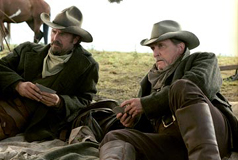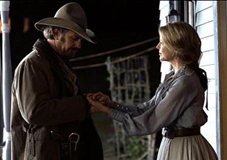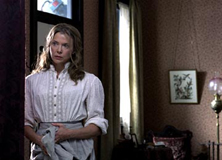Open Range (Kevin Costner, 2003)
 Open Range, Kevin
Costner’s return to the western genre, is a classicist revenge drama that
takes its time in becoming one, and is richer as a result. I’d take this movie
over In the Bedroom, but that’s no
knock on that fine film. Both of them share a script that puts the viewer in a
position where it’s impossible to overcome the mixed feelings that come with
seeing the “hero” of the piece take justice into his own hands. Costner uses
the comfort provided by the familiarity of his chosen genre to put us in a
position to better judge the morality at hand. By setting the movie in the Wild
West, he’s reminding us of our collective roots and turning these seemingly
past actions into relevant commentary about the present. This is the sort of
movie that I wish I could find more often at the multiplex. I appreciate its
straight-talking, no-nonsense attitude. It’s a tone that’s all too rare in
studio pictures, because it can only exist when a movie genuinely has something
to say. Perhaps the mild pun of its title is the biggest joke present here. This
is no epic, but I like the feeling that the characters are big enough as is, and
due to that treatment, they almost feel iconic. They clearly “stand for
something”, but the movie is ambivalent about what exactly.
Open Range, Kevin
Costner’s return to the western genre, is a classicist revenge drama that
takes its time in becoming one, and is richer as a result. I’d take this movie
over In the Bedroom, but that’s no
knock on that fine film. Both of them share a script that puts the viewer in a
position where it’s impossible to overcome the mixed feelings that come with
seeing the “hero” of the piece take justice into his own hands. Costner uses
the comfort provided by the familiarity of his chosen genre to put us in a
position to better judge the morality at hand. By setting the movie in the Wild
West, he’s reminding us of our collective roots and turning these seemingly
past actions into relevant commentary about the present. This is the sort of
movie that I wish I could find more often at the multiplex. I appreciate its
straight-talking, no-nonsense attitude. It’s a tone that’s all too rare in
studio pictures, because it can only exist when a movie genuinely has something
to say. Perhaps the mild pun of its title is the biggest joke present here. This
is no epic, but I like the feeling that the characters are big enough as is, and
due to that treatment, they almost feel iconic. They clearly “stand for
something”, but the movie is ambivalent about what exactly.
 Costner tries, perhaps a bit too deliberately, to channel
John Ford, but since there’s nothing comparable to Ford in the modern film
landscape, that’s not much of a complaint. I like the way that he implicates
the townsfolk by putting them in the backdrops of his compositions when his good
guys clash with the bad guys. Furthermore, there’s something inherently
admirable about a film that manages, like this one, to make gun violence feel
shocking and unnatural again. The loud, sudden blasts that we hear when shots
are fired absolutely rattle the calm, and people fall fast and hard to the
ground after taking a hit. The closing coda might seem like overkill to those
who find happy endings to be terminally uncool, but to me it clarifies why we
were able to the presence of optimism throughout the film, even in its most
sticky moral moments. Costner seems convinced that if you do right, things will
eventually turn out right, and in this era of glib hipsterism that kind of corn
almost feels fresh. One valid complaint is that some of the editing is a bit
shoddy. The ellipses caused when Costner fades to black are either a
miscalculation or a sign that he neglected to shoot some coverage and some of
the slow-motion effects in the climactic shootout are at odds with the retro
style of the rest of the picture.
Costner tries, perhaps a bit too deliberately, to channel
John Ford, but since there’s nothing comparable to Ford in the modern film
landscape, that’s not much of a complaint. I like the way that he implicates
the townsfolk by putting them in the backdrops of his compositions when his good
guys clash with the bad guys. Furthermore, there’s something inherently
admirable about a film that manages, like this one, to make gun violence feel
shocking and unnatural again. The loud, sudden blasts that we hear when shots
are fired absolutely rattle the calm, and people fall fast and hard to the
ground after taking a hit. The closing coda might seem like overkill to those
who find happy endings to be terminally uncool, but to me it clarifies why we
were able to the presence of optimism throughout the film, even in its most
sticky moral moments. Costner seems convinced that if you do right, things will
eventually turn out right, and in this era of glib hipsterism that kind of corn
almost feels fresh. One valid complaint is that some of the editing is a bit
shoddy. The ellipses caused when Costner fades to black are either a
miscalculation or a sign that he neglected to shoot some coverage and some of
the slow-motion effects in the climactic shootout are at odds with the retro
style of the rest of the picture.
 Otherwise, Open Range is
an old-fashioned movie in the best possible ways. A trio of superb performers
heads the cast, but every role is well-acted. Duvall is on gloriously funny autopilot, doing what he does
best to great effect. Bening is in the stereotypical “strong female” role,
but she that strength feel like an unexpected surprise somehow. Costner
underplays constantly, but steps up to the plate to assert himself forcefully
from time to time. A fraudulently conceived movie like this summer’s Seabiscuit is as nostalgic as Open
Range, but not nearly as conflicted as this movie in its portrayal of the
past. Though there’s no doubt that there are a few rarefied subject matters
that deserve a reverent treatment, there aren’t any that benefit from dumbing
down the past for the audience’s supposed benefit. Thankfully, Open
Range doesn’t fall into the trap of the period film, and manages to make
its conflicts relevant, and more importantly, immediate.
Because it refuses to simplify the places we’ve been, it can tell us
something about the place we currently are.
Otherwise, Open Range is
an old-fashioned movie in the best possible ways. A trio of superb performers
heads the cast, but every role is well-acted. Duvall is on gloriously funny autopilot, doing what he does
best to great effect. Bening is in the stereotypical “strong female” role,
but she that strength feel like an unexpected surprise somehow. Costner
underplays constantly, but steps up to the plate to assert himself forcefully
from time to time. A fraudulently conceived movie like this summer’s Seabiscuit is as nostalgic as Open
Range, but not nearly as conflicted as this movie in its portrayal of the
past. Though there’s no doubt that there are a few rarefied subject matters
that deserve a reverent treatment, there aren’t any that benefit from dumbing
down the past for the audience’s supposed benefit. Thankfully, Open
Range doesn’t fall into the trap of the period film, and manages to make
its conflicts relevant, and more importantly, immediate.
Because it refuses to simplify the places we’ve been, it can tell us
something about the place we currently are.
69
08-23-03
Jeremy Heilman